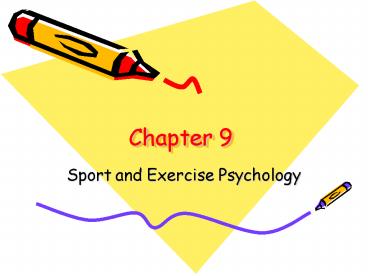Sport and Exercise Psychology - PowerPoint PPT Presentation
1 / 27
Title:
Sport and Exercise Psychology
Description:
'The systematic scholarly study of the behavior, feelings, ... Griffith, 1938, hired by Philip Wrigley as the Chicago Cubs baseball team's sport psychologist. ... – PowerPoint PPT presentation
Number of Views:1118
Avg rating:3.0/5.0
Title: Sport and Exercise Psychology
1
Chapter 9
- Sport and Exercise Psychology
2
Sport Psychology -Defined
- The systematic scholarly study of the behavior,
feelings, and thoughts of people engaged in
sport, exercise, and physical activity-Vealey
3
Defined-Continued
- Focuses on the psychological and mental aspects
of participation in sport and exercise, seeking
to understand how psychological processes
influence and are influenced by participation
(AAASP).
4
Historical Development
- Early history is sport psychology is related to
Motor Learning. - Both emerged as sub-disciplines in the late
1960s- and early 1970s.
5
Early History
- Norman Triplett, 1898, studied the effects of an
audience on motor performance. - Coleman Griffith, 1918, (father of sport
psychology) wrote Psychology of Coaching in 1926
and Psychology of Athletics in 1928.
6
Early History-continued
- Griffith, 1938, hired by Philip Wrigley as the
Chicago Cubs baseball teams sport psychologist.
Researched ways to enhance motivation and develop
self-confidence.
7
Early History-continued
- 1940-1965 Research was sporadic. After WW2
Motor Learning programs were established in
colleges and universities. Henry, Slater-Hammel,
Hubbard, and Lawther developed research in motor
learning and performance. (currently within the
realm of sport psychology)
8
Early History-continued
- 1949, Warren Johnson, looked at pre game emotion
in football. 1951, The Psychology of Coaching
(emotions associated with competition). - 1964, Bryant Cratty, Movement Behavior and Motor
Learning and 1967-Psychology and Physical Activity
9
History-Continued
- Late 1960s-Early 1970s-emergence of Sport
Psychology. Courses were developed within grad
and undergrad programs. - 1965 International Society of Sport Psychology
was founded. - Journal of Sport Psychology began publication in
1979.
10
History-continued
- 1980s Tremendous Expansion
- Intervention/Performance Enhancement
- Health Psychology
- Social Psychology
- Clinically trained psychologists
- Applied approach
- Psychological factors that influence
participation in fitness, wellness, etc
11
History-continued
- 1990s separation of study in Sport Psychology
and Exercise Psychology.
12
Areas of Study
- Why do some athletes choke under pressure?
- Why do some postcardiac patients fail to complete
their rehab program? - Does exercise reduce stress?
13
Areas of Study-Continued
- Research in Psychology can help teachers,
scientists, sport leaders make modifications to
programs to enrich experiences for clients.
14
Psychological Benefits of Exercise
- Page 334
- 1
- 2
- 3
- 4
- 5
- 6
- 7
- 8
- 9
- 10
- 11
15
Exercise Adherence
- Estimated ½ of all patients fail to comply with
medical treatment. Why? - Classic Learning Theories
- Health Belief Model
- Social Cognitive Theory
- Transtheoretical Model of Health Behavior
- Ecological Approach
16
The Transtheoretical Model-Prochaskas Stages of
Change
- Precontemplation
- Contemplation
- Preparation
- Action
- Maintenance
- Termination
- Decisional Balance
- Self Efficacy
17
Why do individuals drop out of programming?
- Low Self Motivation
- Depression
- Low Self Efficacy
- Denial of seriousness of condition
18
Who Drops OUT?
- Smokers
- Blue Collar Workers
- Obese Individuals
- Type A Personalities
- People who lack support from others
19
Personalities
- Does Sport Influence Personality?
- Are their Psychological Differences between
Athletes and Non-Athletes? Or between Elite
Athletes and their less successful competitors? - 1. 2. 3. 4.
20
Anxiety and Arousal
- Anxiety A subjective feeling of apprehension
accompanied by a heightened level of
physiological arousal. (sweaty hands, urge to
urinate, increased respiration rate, elevated
heart rate, increased muscle tension) State/Trait
21
Anxiety and Arousal
- Arousal
- Low Level of Arousal may create motivation,
inattention, and inappropriate slow movement
choices. - High Level of Arousal may cause deterioration in
coordination, inappropriate narrowing of
attention, distractibility, lack of flexibility
in movement response.
22
Goal Setting
- Goal Setting is important as a motivational
strategy, and a strategy to change behavior or
enhance performance. - Outcome Goals
- Performance Goals
- Process Goals
23
Principles of Effective Goal Setting
- Specific
- Measurable
- Action Oriented
- Realistic
- Timely
24
Self Talk
- Task Relevant Statements
- Positive Self Statements
- Mood Words
25
Application of Self Talk
- Uses for
- Enhancing Skill
- Focusing Attention
- Modifying activation
- Promoting Self Confidence
26
Attention
- Attention the ability to direct senses and
thought processes to particular objects, thoughts
and feelings. - Can be Width Dimension or Direction Dimension
27
(No Transcript)































